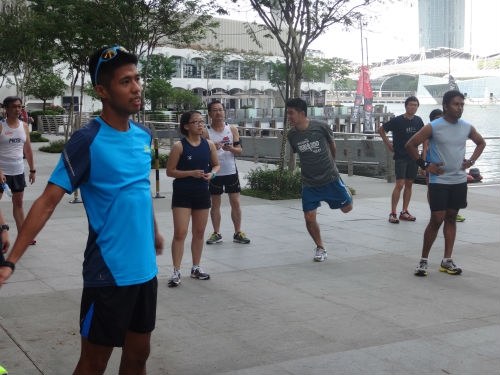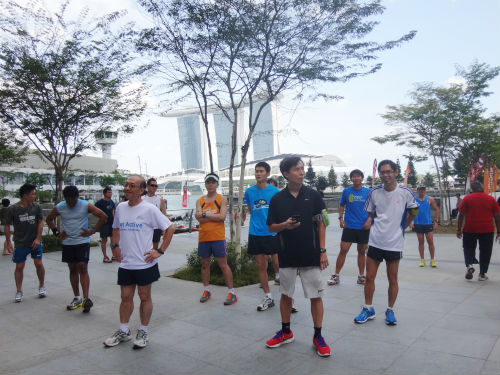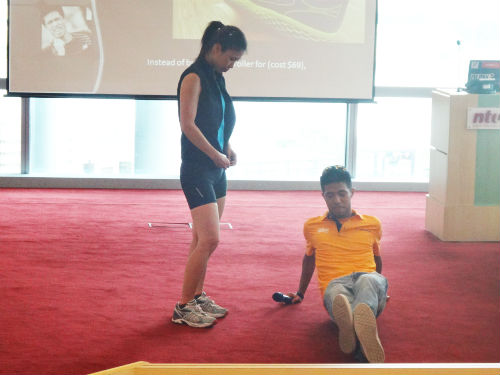To prepare runners for the NTUC Income Run 350, which will be held on 27 April this year, top runner Marcus Ong was invited to give a talk last weekend on pre-race preparation and recovery.
Marcus is a seasoned runner in Singapore and has many accolades, including winning both the Standard Chartered Marathon Singapore (Ekiden Category) and the Great Eastern Johor Bahru International Run (10km Category) last year.
To find out what Marcus shared with runners at the talk, do read on.
Pre-Race Preparation
One week before the race
Marcus advises runners to eat more carbohydrates. This is a common process known as carbo-loading. Types of foods include pasta and white rice, but make sure that you keep to a five-finger portion. If you consume too much carbohydrates, it will cause a bloated and uncomfortable feeling during the race. Vegetables are also fine to eat, but try to minimise your intake of fried foods during this period.
As well, runners should sleep well and get at least eight hours of sleep every night. For Marcus himself, he makes sure that he gets 12 hours per night, in the week leading up to the race.
Three Days before the Race
Runners should do easy-routine exercises, such as yoga, for at least two hours per session, during the three days before the race. The reasons for these are to increase flexibility of the core muscles and to untangle any knots that may have formed during the tough training sessions.
The Day before the Race
For the day before your race, mental focus is very important. You need to plan your race strategy and race target. For example, if you are tackling a 10km race, you may want to target a five-minute per kilometre pace.
It will also help if you tape up any tight muscles with kinesiology tapes and wear compression socks, because this may help to reduce the aches and cramps during the run.
It is also important to prepare your running gear – that is, your energy gels, protein drinks, as well as a massage ball to massage your aching legs yourself once the race is over.
Then try and catch some sleep. If you are not able to sleep, you can watch some funny movies to lighten up your mood and get you in the right frame of mind to run.
Two Hours Before the race
This should be just before you leave the house. Marcus advises that you should do some static stretching for about 30 minutes. This will include lunges, heel lifts and leg raises and will help to ensure the flexibility of your muscles and make sure your body engine is working to perfection.
One Hour before the race
Try and take an energy gel, because it will help to give you an extra boost of energy that you will need for the race.
Going into the Race
As the impending race is approaching, you should psyche yourself to relax and allow yourself to feel happy that you are about to run. Then execute the race plan that you have prepared and you will enjoy your run.
Post Race Recovery
Marcus says that many running injuries are a result of overtraining and over-doing your running at the race. As well, inflexible muscles can also cause injuries and sometimes runners may have carried on even if they had felt pain during a race – thus aggravating any hurt muscles and resulting in a full-blown running injury.
However, the correct method of post-race recovery will ensure that your immune system remains just as strong and it will also prevent any potential injuries from occurring.
Here are some recommendations that you can use for post-race recovery.
15 to 30 Minutes after the Run
During this time frame, you should do slow jogging or walking to delay muscle soreness. The last thing you should be doing is to sit down. This is because sitting causes plenty of problems, such as tightness and knots in your muscles and will prevent you from being able to even run properly the following day.
40 Minutes after the Run
You should eat something that contains carbohydrates, sugars and proteins, such as a banana or a granola bar. Protein drinks or chocolate milk will also be great, if you are feeling thirsty rather than hungry.
The Night after the Race
This is the time when you should let yourself loose and allow yourself to indulge in all the junk food that you haven been craving for. You have worked hard to complete the race, so now is the time to enjoy yourself.
As well, try and go for a sports massage and use a foam roller to massage your sore feet. Wearing compression tights and using kinesiology tapes on your sore legs will also help to give them some form of protection and ensure that you will feel more comfortable the next day.
The Next Morning
The morning after your race, you should check your heart rate to see if it is working normally. The average resting heart rate per minute for an active human being should be 49 to 59 beats. If this is the case, you will be fine to go out for a slow jog or walk – to shake up your muscles.
But if it is still high, at somewhere between 69 to 79 beats, make sure that you have a slow and easy day – do not over-exert yourself.
The Next 1 to 2 days
According to Marcus, you should take an easy run on a soft surface, such as grass. You should not do road running, because this will injure and aggravate your muscles even more.
Also, try and drink protein shakes after your run and stick to a healthy diet. Other cross-training exercises, such as cycling and core workouts like planking exercises will also be able to help you recover after the run.
1 Week later
A week after the race, you should be ready to ease into a proper training routine again for your next race. But take note that if you are not ready, give yourself more time. According to Marcus, if you rush your recovery process, it will only lead to more injuries – and that is the last thing you will probably want.
Click here – for the Q&A session on running tips by Marcus (Part 2).





Leave a Comment